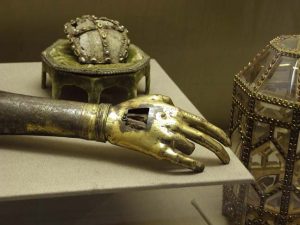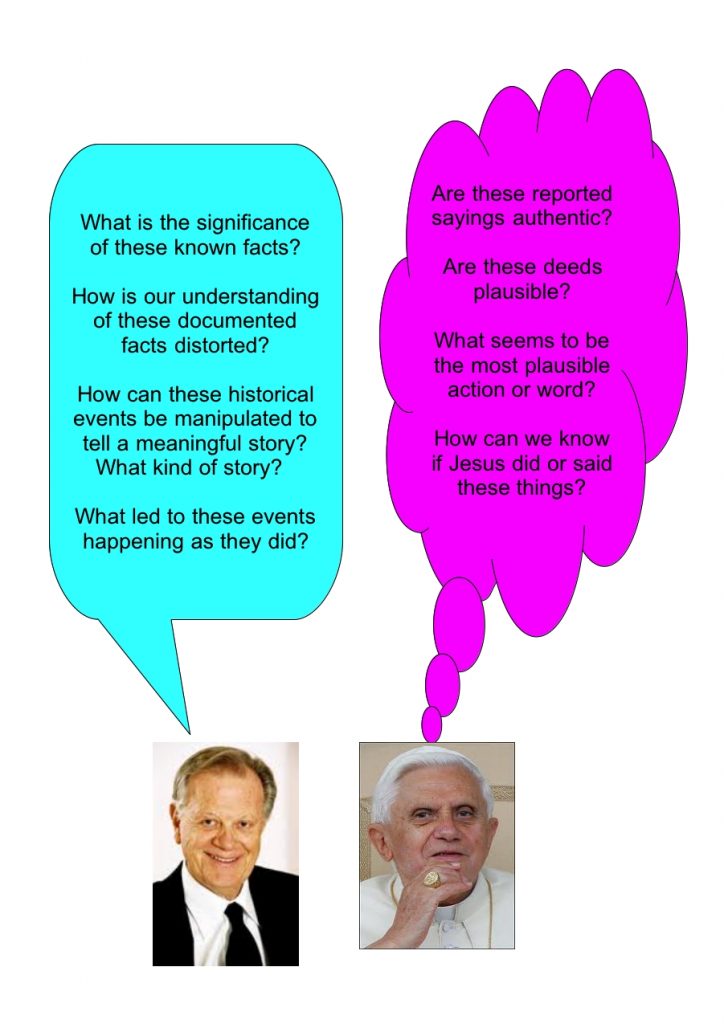
I have once again suffered the all too familiar pain of reading a quite modern scholarly article by a historical Jesus scholar who appears to be quite confused over how New Testament studies of the historical Jesus compares with other types of historical inquiries. When I say I am pained I mean that in the sense of regret and loss because the scholars is clearly very brilliant and I really do love to read works by biblical scholars that I find rewarding and thought-provoking. And I have read many of these and discussed aspects of their works positively on this blog.
So when I come across a scholar who demonstrates a particular flaw that seems to be institutionalized in the entire field of New Testament studies I do believe it is right and necessary to draw attention to the problem. Not that I presume that anything I say will change the world, but I do believe it is a good thing for anyone to help promote awareness, understanding and questions. I know from personal experience (also very painful) how easy it is to be wrong; for that reason I write for anyone else with a similar willingness to always question their foundational assumptions.
Next week I hope to discuss the problematic article in some more depth. For now I am merely raising the issue. I have drawn another graphic to illustrate the problem.
On the left hand side I have listed the sorts of questions historians generally ask of the material they are researching. The picture at the bottom is a controversial modern scholar of historiography, Hayden White. He is also known as a postmodernist historian. The questions framed above him include some that he himself has asked in depth. (I use White to illustrate historians generally because the sorts of questions he raises and the material with which he works do overlap with concerns of many other modern historians, even those who are not postmodernists.)
On the right hand side I have listed the sorts of questions that engage historical Jesus scholars. (I have added a random picture of a theologian to match White.) Now there seems to be a shift among a number of New Testament scholars towards what they see as a postmodernist approach to the study of the historical Jesus. And that’s why I have added such questions (in abbreviated form) as “What might Jesus have plausibly done or said to explain why we have such unrealistic and contradictory reports about him in the Gospels?” One will notice that that’s not the sort of question a postmodernist like Hayden White asks.
Historical Jesus scholars are plagued by the question of “authenticity”. What is the “authentic” saying or deed of Jesus? Not unlike (as one scholar herself points out) asking questions about relics that serve to prove one’s faith: “Is this preserved thumb really the thumb of the real John the Baptist?”

In other words, historical Jesus scholars are still engaged in the alchemical quest of finding the right recipe for producing golden historical memories out of theological narratives that demonstrate no interest in preserving historical memory as it is understood by moderns. The same narratives do not even conceptualize Jesus as a historical person in the modern sense of the term. I will address the details to justify this statement next week, I hope.
Anyway, here is my little graphic to illustrate the contrast between what historical Jesus scholars are doing and what other historians are doing.
Not that I’m a nihilist. Of course a genuinely historical account of Jesus is impossible given the nature of the material historians have at their disposal. But that only leads to even more interesting questions. If we are without a history or biography of Jesus, then why? And what do we have instead? And how is all of that explained? A few scholars who are focusing in particular on literary and comparative ideological analyses of the Gospels are raising some very thought-provoking possibilities.
If you enjoyed this post, please consider donating to Vridar. Thanks!


For me it is very important to construct a believable scenario of Jesus, just so that theists can begin to imagine for themselves what must have really happened. There are lots of different versions of him that some might wish to offer, like someone who wasn’t literate, which to me throws everything off from the get-go, or a literate Jesus as I have been trying to construct and give a number of reasons for. National Geographic put a version of Jesus in a series of programs a few years ago and made some good points, but I thought I could do a better job and make a more believable Jesus from the information that is available. Even if we don’t nail it, as perhaps any narrative can always be improved, it’s incredibly important, I think, that theists and their children are confronted with a good scenario, which to me is key to their religion no longer being able to run roughshod over so many people with its authoritarian nature as it has been; put it to some extent back in its fictional box where it belongs, and then we will work on human behavior and loving one another from a better angle than a religious one. I’m, of course, not an historian; and if a scenario isn’t credible enough by it not being critical enough then it won’t be much good for anything. So I do try to listen to and absorb several things that historians say as I continue moving forward on this topic.
The problem as I see it is circularity. We only have theological claims about a Jesus who is not even a human by our standards. We have no historical or biographical (even by ancient standards) accounts of such a person.
Biblical scholars begin with the assumption — that’s all it is — that there was an historical Jesus behind the Gospel narratives. They then try to find ways of teasing apart the theological claims in the Gospels to see if they can extrapolate back to an argument that these originated to some extent from a genuine life of Jesus.
They simply assume there is some historical basis to the Gospel narratives even though their peers have established that every deed and saying in the Gospels can be explained as deriving from the theologically creative minds of the authors.
Contrast the approach of Tom Holland towards the origin of Islam. Now I’m not saying I agree with Tom Holland’s conclusions (I am still short of half way through his book) but I do believe his approach is valid. He sees that we have no evidence contemporary with the Muhammad of the later narratives, so he goes to where the earlier evidence is and starts from there. He does not start with the later evidence and then try to speculate on how it might all have been based on a true story. That is what has to be proven. It’s not valid to begin with the assumption that it was derived from true events.
Actually, I think that the book of Acts (8:27-35) proves Jesus is a midrash style allegorical invention from the Septuagint. And, not only is the Acts obviously a complete fantasy-land of miraculous happenings but that whoever wrote it could have written a true history of the origins of Christianity but chose to write fantasy instead. There has to be a reason for that and one reason could be, and probably is, deception. At the time the Acts was written (2nd century) Jesus was already thought to be an historical person instead of a personification of the symbolic suffering servant of Isaiah. Also, Paul needed to be the one who established gentile “churches” instead of converting already established “churches” to his particular gospel. Of course, right behind Paul came the Judaizers (Peter, James and John) who were turning them away from Paul to their particular gospel. So, who were these gentile “churches” (or ekklesias) that already existed before Paul had even visited them? (And the letter to the Romans gives it away that the Roman ekklesia already existed before Paul had even been there).
It could be that gentiles who had previously been converted to Judaism had separated themselves from the Jews and formed their own ekklesias because of all the rebellion of the Jews against the Romans – beginning about 6 AD with Judas of Galilee. And it was to these ekkesias of gentiles that Paul went preaching his gospel of Jesus. Meanwhile, Peter, James and John preached their gospel of Jesus to the Jewish synagogues.
It’s speculation, but hey, that’s what all of it is.
According to this David Trobisch book (which Price agrees with) the 2nd century author of Acts would be Polycarp:
http://www.robertmprice.mindvendor.com/reviews/trobisch_first.htm
Another contender whose name has been thrown into the ring is Clement of Rome: http://vridar.wordpress.com/2012/01/20/couchoud-on-acts-of-the-apostles/
Helms makes an interesting case (one I’ve never encountered elsewhere) that Luke may have been a woman.
http://www.amazon.com/Wrote-Gospels-Randel-McCraw-Helms/dp/0965504727/ref=sr_1_2?ie=UTF8&qid=1365190456&sr=8-2&keywords=randel+helms
In the category of “strangely hilarious,” we have this tongue-in-cheek article by Henry J. Cadbury that explores the possibility that Luke was a veterinarian:
Lexical Notes on Luke-Acts: Luke and the Horse-Doctors
“…historical Jesus scholars are still engaged in the alchemical quest of finding the right recipe for producing golden historical memories out of theological narratives…”
And when the right recipe cannot be found, they don’t admit defeat or reexamine their premise. Instead, they insist that all other recipes are wrong, too.
I know that many of you approach the HJ question as an historian, as Neil laid out, especially in his comment. But to me, since Jewish messianic prophecies really exist right now as well them having existed long ago, then there were some reasons why those were written which sould be explored, which is the sort of thing I do since those are something I know quite well, even going way back to when I used to be a theist many years ago from now. If those messianic prophecies were written long ago, which those were, and there were political motives involved in whay that happened, which there were, and if Jews tend to be very studius, which they do, then it is plausible that some Jews thought that those messianic prophecies were really from the Hebrew deity, were essentially divine and would be fulfilled. And Jesus looks to me as if he was one of those who thought those might be true; or at least to me that is very plausible to see him in that way. I think a scenario built from that kind of basis is needed and that many Christians today need to be reached with the probability of that being what really happened. Here is what I have so far on such a scenario, ten parts, where I lay out my reasons in ten segments so far: https://www.facebook.com/AtheistsWhoLove?fref=ts#!/AtheistsWhoLove/posts/439947619416137 I don’t expect anyone here to read them since they would take a good amount of time, but wanted to let some of you know where I’m coming from on this.